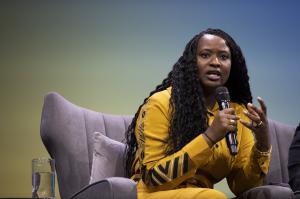Deal with our 'culture wars' to combat democratic backsliding - President Obama

Country Director at Accountability Lab Mali Doussouba Konaté, said that democracy “on the streets” had taken over from democracy through the ballot in the Sahel region.
President Obama was in conversation with Obama Foundation Leaders from Mali, Palau, Belarus and Argentina
WASHINGTON D.C., DISTRICT OF COLUMBIA , UNITED STATES, November 18, 2022 /EINPresswire.com/ -- Keeping young people engaged in governance processes creatively to help prevent democratic backsliding was one of the key messages from Accountability Lab at the Democracy Forum in New York this week.
Speaking on a panel with President Barack Obama, Country Director at Accountability Lab Mali Doussouba Konaté, said that democracy “on the streets” had taken over from democracy through the ballot in the Sahel region. “Despite multiple issues we’re currently undergoing, the youth is actually expecting a generation of leaders that will step up and work with integrity so people can access basic needs,” Konaté said. One of the most effective strategies to keep young people engaged had been through positive narratives and empowering storytelling, she added. “People need to believe that change is possible.”
The Democracy Forum was organized by the Obama Foundation on November 17 and brought together Obama Foundation Leaders with leading academics and practitioners to unpack some of the themes impacting democratic pluralism around the globe. Obama was in conversation with Konaté and three other Leaders including Landisang Kotara from Palau, Nick Antipov from Belarus and Natalia Herbst from Argentina. Obama said that defenders of democracy everywhere were fast realizing that solutions extended far beyond just fixing the mechanics of elections or putting the right economic policies in place. Activists needed to address basic questions about culture, values and identity in order to find common ground.
“A lot of times those of us who are interested in democracy promotion have tried to wish away these so-called culture war questions. We like to focus on rules, law, policy and calculations and we tend to see policy and governance as this constant negotiation between competing, rational, self-interested actors - but that’s not how most of us experience the world. We may operate on the basis of very concrete material interests… but we also care deeply about having a coherent story about who we are and our place in the world. We care deeply about a sense of identity, belonging and status,” Obama said.
Konaté said massive protests in the Malian capital of Bamako over the past year had proved the failure of the social contract between communities and the government. “A part of the population in Mali is actually supporting the military coups as it appears to them that [the military is] the strongest institution because the government has not been able to provide for them,” she explained. “The population has no access to basic needs like security because of conflicts in the northern part of Mali and also in neighboring Niger and Burkina Faso. There is corruption also which is creating so many exclusions as people have no access to economic opportunities,” she added.
Obama said the foundational principles of democracy itself were currently under threat in many world regions. These included the rights to freely participate in elections and the notion that political debates “should at least aspire to be rooted in facts and logic, rather than fabrication and propaganda”. The Democracy Forum had identified three things to investigate further, he added. Firstly, a more sustainable and inclusive model of capitalism; secondly, how to reimagine traditional and social media to curb toxic disinformation; and thirdly, how to strengthen the forces of pluralism in an increasingly diverse world.
Herbst said there were many lessons in past examples of community organizing in Argentina that remained relevant today. “The way communities are currently organized, compared to a few decades ago, it’s very unlikely that they engage with other people from their home communities whose lives are very different to theirs. But when it does happen, everyone involved is transformed for the better. So I guess the challenge is recreating this at scale,” she said.
Kotara meanwhile shared that the heart of democracy was “love and service”. “It’s only by identifying the values that we share that we can come together and really be innovative in those changes. Sometimes, innovation and positive change is not something we have to think outside the box for. Sometimes it’s about going back to our roots,” Kotara shared.
Konaté said approaches that considered community resources, interests and also mental health were key. “Whenever we hear something about the continent, most of the times unfortunately it’s negative news. And God knows that on the continent there are amazing things going on, and amazing people doing amazing jobs. We need to flip the narrative and focus on the positive things because this is how we can inspire people, shine a light on role models, and show the youth there are other ways to do things,” she said.
Sheena Adams
Accountability Lab
+27 83 411 3161
comms@accountabilitylab.org
Legal Disclaimer:
EIN Presswire provides this news content "as is" without warranty of any kind. We do not accept any responsibility or liability for the accuracy, content, images, videos, licenses, completeness, legality, or reliability of the information contained in this article. If you have any complaints or copyright issues related to this article, kindly contact the author above.


